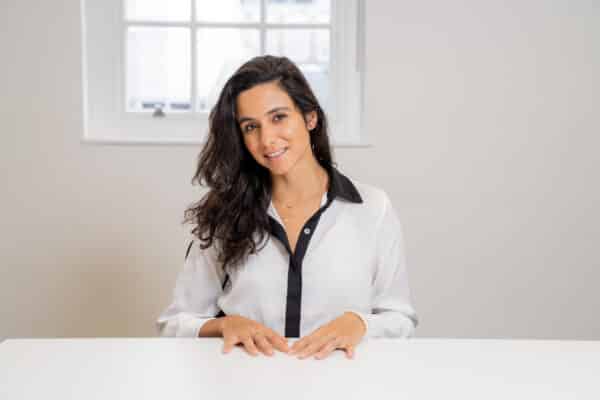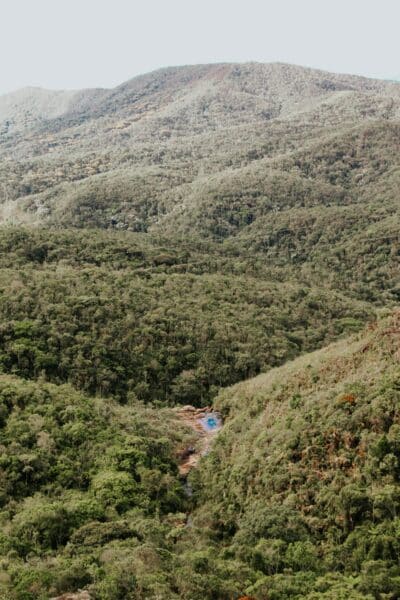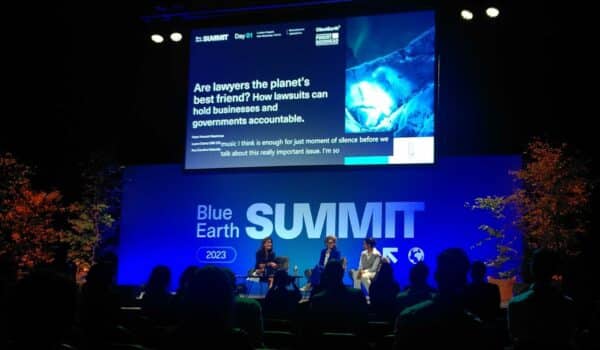When Ana Carolina Salomão Queiroz was 15, living in Sao Paulo, Brazil, she had dreams of becoming a diplomat. Fast forward to today and she is chief investment officer for Pogust Goodhead – a law firm with a central London HQ, but a very different type of city law firm.

Among its current case load is representation for 700,000 people affected by the Mariana dam disaster. The Mariana dam was a tailings dam – used to create pools of harmful wastewater from mining activity – which failed in 2015 causing widespread devastation.
Salomão Queiroz co-ordinates the funding for this and numerous other cases where private capital is used to bring cases, often against large corporate defendants, for committing environmental damage.
Incredible and impactful work. So how did she get here?
When I shared my dream of becoming a diplomat with my father, I said I wanted to go to the University of International Relations in Brasília. But even though it’s a public university, it was in a different city. I don’t come from a privileged background; how could I live in a different city?
He helped me to research where the most famous or the biggest number of diplomats studied in Brazil. They all graduated from the Law School of Sao Paulo – also a public university. So, I said, OK, that’s what I’m going to do.

I fell in love with corporate law. I started to work as an intern at a law firm working in corporate tax; I found it so interesting, the relationship with the client, solving their problems. And in tax there is the public policy meeting the private interests. I fell into this career pathway, starting with a law firm, then investment banks, family offices and private equity.
I left Brazil to study a second masters degree; it was a sabbatical. In my first week in London in 2018 there was a conference about the Brazilian economy, sponsored by Pogust Goodhead. I met the founders and they told me about this potential transnational litigation being brought in England and the Netherlands over events that had happened in the Minas Gerais region of Brazil. They said they were looking for a new financial partner for the firm and I had all of these contacts from my work in financial markets, private equity, litigation finance.

The firm was bringing class action cases, environmental law, human rights, but I’m a financial lawyer so I thought what will I do here? I found the opportunity to do something different, to use finance, contractual, corporate law to change the way those litigations are funded. For the first time, I could use my knowledge and financial law and combine it in my passion – social impact.
I’m the successful result of a scholarship that I received when I was 10 years-old. Yes, I have studied and worked a lot but I’ve had the privilege of scholarships and public institutions that have helped me. It’s very clear in my mind, I’m very privileged and I should do what I can to repay that. Tom Goodhead manages the firm in a different way. He sees opportunities and goes for them. He’s never blocked my ideas; really there was an open canvas and that’s not how it’s normally done in law firms.
It is quite radical. We’re not in the magic or silver circle of firms that have a pool of major clients they cannot act against. We don’t have that. That is the first difference; secondly, we’re providing access to good quality legal service to those who wouldn’t otherwise have access to that. The legal profession is hierarchical and elitist. Legal representation costs a lot; they’re just some of the barriers to justice.
It doesn’t matter that you’re printing on two sides of paper or drinking from reusable mugs, if you’re helping mislead or deviate from regulation or advising on how to corrupt without being caught by the legislation. This is very much ingrained in the culture of what it is to be a good lawyer.
People think that being a lawyer is being well dressed, speaking with a certain accent and charging expensive fees. This is not being a lawyer. Being a lawyer is understanding the law, criticising the law, informing your clients about the law, and understanding what underpins it. Being a lawyer is being a channel between the law and those who are subject to the law, and have rights under the law. Sometimes that is disconnected.
We disrupted the market by going straight to clients affected by environmental disasters and asking if they wanted a legal service. It’s free. If you win, you receive your award and we retain a contingent fee. If you lose the case, all the costs are ours.
We operate a very negative trade credit; we spend for years and years without knowing what the outcome will be. We can only do this by disrupting the financials of the firm and using third-party litigation funding. When we started out four and half years ago, we didn’t have a portfolio of filed cases; I went out to funders like a start-up approaching a venture capitalist. And we have to look at all of the potential funders in the world because we have a diverse portfolio of cases. Case A will fit the mandate of funder X but case B will fit the mandate of funder Y, because they are in a different jurisdiction.
The other big task was putting a quantum valuation on cases that were not even filed. We have structured investments, understanding the risks and packaging them for specific portfolios.
Big companies have their bankers, bond markets, equity – capital markets providing funding and financing. Why couldn’t a law firm do something similar? Why couldn’t a firm access capital markets to provide indigenous communities, fishing communities, people living below the poverty line around the world with access to justice? Nobody could answer that question.
The Mariana dam case against BHP Billiton was always a red flag case. I had to find a way to fund it using receivables from other litigations because investors were fearful because, in theory, we had little chance of success after we lost the first judgment and we needed to file a motion to reopen the case. At that point, I would say that 99.9% of law firms in the world would have dropped the case.
Now it’s a case that most investors would be interested in; because of the scale of it – Vale [Brazilian mining company] is now on the same proceeding – and because we have passed one of the most challenging parts, the jurisdiction assessment. We are now in the discovery phase, going through documents, emails and messages exchanged between company executives. They have very strong incentives to not let it go to trial next year.
Firms like ours and everyone else doing great legal work in this area is changing how industries work. I do wonder, if this is really a type of diplomacy. We’re changing the G in the corporate world of environment, social, governance (ESG). In mining, the risk and reward on fortifying a tailings dam – the type of dam that collapsed in Mariana – is shifting.

Salomão Queiroz speaking about holding business and governments accountable at the Blue Earth Summit 2023
We talk about corporations as institutions, which they are, but that’s a legal fiction, they do not actually exist. Corporations are the directors, the employees, the shareholders; they do exist. The culture those individuals operate in is changing. Of course, you can ask if mining resources from the earth can ever be sustainable, but that aside, you can see culture change happening directly in what a firm is doing. That’s something I hope to see at BHP, when we sit down at the table finally, to negotiate a settlement that is fair and complete on behalf of our clients.
There’s also a culture change that is yet to be seen in the legal profession. The talk at the moment about the possibility of scope 4 emissions: the emissions created by the advisory work of law firms. With this, it doesn’t matter that you’re printing on two sides of paper or drinking from reusable mugs, if you’re helping mislead or deviate from regulation or advising on how to corrupt without being caught by the legislation. This is very much ingrained in the culture of what it is to be a good lawyer. This is the culture that I’m waiting to see change.
+
The Mariana Dam Disaster case: “One of the biggest legal claims ever filed in the Courts of England and Wales”
Image credits
Pogust Goodhead
Carlos Kenobi via Unsplash
Studio Michael Franca via Unsplash
Paul Dicken